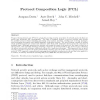Free Online Productivity Tools
i2Speak
i2Symbol
i2OCR
iTex2Img
iWeb2Print
iWeb2Shot
i2Type
iPdf2Split
iPdf2Merge
i2Bopomofo
i2Arabic
i2Style
i2Image
i2PDF
iLatex2Rtf
Sci2ools
102
click to vote
ENTCS
2007
2007
Protocol Composition Logic (PCL)
Protocol Composition Logic (PCL) is a logic for proving security properties of network protocols that use public and symmetric key cryptography. The logic is designed around a process calculus with actions for possible protocol steps including generating new random numbers, sending and receiving messages, and performing decryption and digital signature verification actions. The proof system consists of axioms about individual protocol actions and inference rules that yield assertions about protocols composed of multiple steps. Although assertions are written only using the steps of the protocol, the logic is sound in a strong sense: each provable assertion involving a sequence of actions holds in any protocol run containing the given actions and arbitrary additional actions by a malicious adversary. This approach lets us prove security properties of protocols under attack while reasoning only about the actions of honest parties in the protocol. PCL supports compositional reasoning ab...
Related Content
| Added | 13 Dec 2010 |
| Updated | 13 Dec 2010 |
| Type | Journal |
| Year | 2007 |
| Where | ENTCS |
| Authors | Anupam Datta, Ante Derek, John C. Mitchell, Arnab Roy |
Comments (0)

